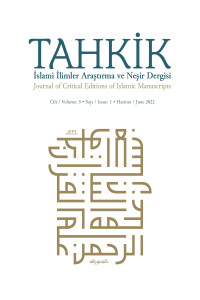Marcela A. Garcia Probert. and Petra Sijpesteijn, Amulets and Talismans of the Middle East and North Africa in Context. Transmission, Efficacy and Collections, Leiden: Koninklijke Brill NV, 2022, 306 p.
Öz
The need for achieving something and protection has always been prevailing in all societies throughout history, whether it is nature, spirits or a higher deity that have been recourse to. Amulets and talismans are put in use as the mediums for this purpose. Even though their definition and use in practice is not clear-cut, amulets are described as some kind of magical object that can be used continuously and by different users for different purposes the person needs. Talismans, on the other hand, are designed for defined needs and purposes and a specific person. They do not display a monotype characteristic in terms of structure, production, use and perception. However, the fact that their functions are perceived as a way to communicate with the supernatural in the hope of getting divine intervention and help for the specific purpose and need they are being used.
Amulets and talismans reflect the socio-cultural and historical background in which they emerged and developed as objects of religious, medical and mystical practices for protection from evil, diseases, etc. Amulets and Talismans of the Middle East and North Africa in Context, a collection of articles focused on various aspects of amulets and talisman and edited by Marcela A. Garcia Probert and Petra M. Sijpesteijn aims to examine these historical objects, their use, interpretation, transformation in time, how people perceived them as well as their functions within the framework of a living religion.
The book consists of three parts, which approach amulets and talismans and their study from different aspects and questions, and 11 chapters in total with a commencement of a brief introduction. The introduction sets out its perspective on the topic, the definition of amulet and talisman, their origins, sources and functions, and lastly, their location and preservation in the study of amulets. As the volume is a collection of case studies on amulets and their study, the introduction gives general and informative background information that a reader who is unrelated to the topic may need throughout the book.
Anahtar Kelimeler
Kaynakça
- A., Garcia Probert Marcela, and Petra Sijpesteijn. Amulets and Talismans of the Middle East and North Africa in Context. Transmission, Efficacy and Collections. Leiden: Koninklijke Brill NV, 2022.
Marcela A. Garcia Probert. and Petra Sijpesteijn, Amulets and Talismans of the Middle East and North Africa in Context. Transmission, Efficacy and Collections, Leiden: Koninklijke Brill NV, 2022, 306 p.
Öz
The need for achieving something and protection has always been prevailing in all societies throughout history, whether it is nature, spirits or a higher deity that have been recourse to. Amulets and talismans are put in use as the mediums for this purpose. Even though their definition and use in practice is not clear-cut, amulets are described as some kind of magical object that can be used continuously and by different users for different purposes the person needs. Talismans, on the other hand, are designed for defined needs and purposes and a specific person. They do not display a monotype characteristic in terms of structure, production, use and perception. However, the fact that their functions are perceived as a way to communicate with the supernatural in the hope of getting divine intervention and help for the specific purpose and need they are being used.
Amulets and talismans reflect the socio-cultural and historical background in which they emerged and developed as objects of religious, medical and mystical practices for protection from evil, diseases, etc. Amulets and Talismans of the Middle East and North Africa in Context, a collection of articles focused on various aspects of amulets and talisman and edited by Marcela A. Garcia Probert and Petra M. Sijpesteijn aims to examine these historical objects, their use, interpretation, transformation in time, how people perceived them as well as their functions within the framework of a living religion.
The book consists of three parts, which approach amulets and talismans and their study from different aspects and questions, and 11 chapters in total with a commencement of a brief introduction. The introduction sets out its perspective on the topic, the definition of amulet and talisman, their origins, sources and functions, and lastly, their location and preservation in the study of amulets. As the volume is a collection of case studies on amulets and their study, the introduction gives general and informative background information that a reader who is unrelated to the topic may need throughout the book.
Anahtar Kelimeler
Kaynakça
- A., Garcia Probert Marcela, and Petra Sijpesteijn. Amulets and Talismans of the Middle East and North Africa in Context. Transmission, Efficacy and Collections. Leiden: Koninklijke Brill NV, 2022.
Ayrıntılar
| Birincil Dil | İngilizce |
|---|---|
| Konular | Din Araştırmaları |
| Bölüm | Kitap Değerlendirmeleri |
| Yazarlar | |
| Yayımlanma Tarihi | 30 Haziran 2022 |
| Gönderilme Tarihi | 27 Haziran 2022 |
| Yayımlandığı Sayı | Yıl 2022 Cilt: 5 Sayı: 1 |

